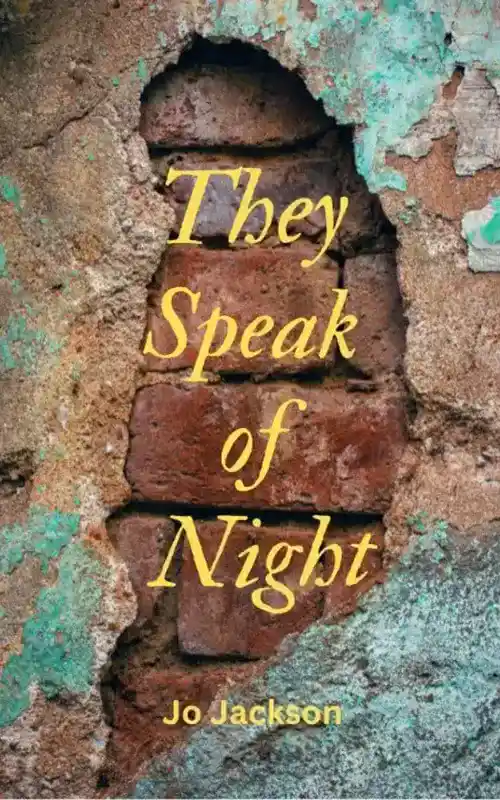This post may contain affiliate links. Read more here.
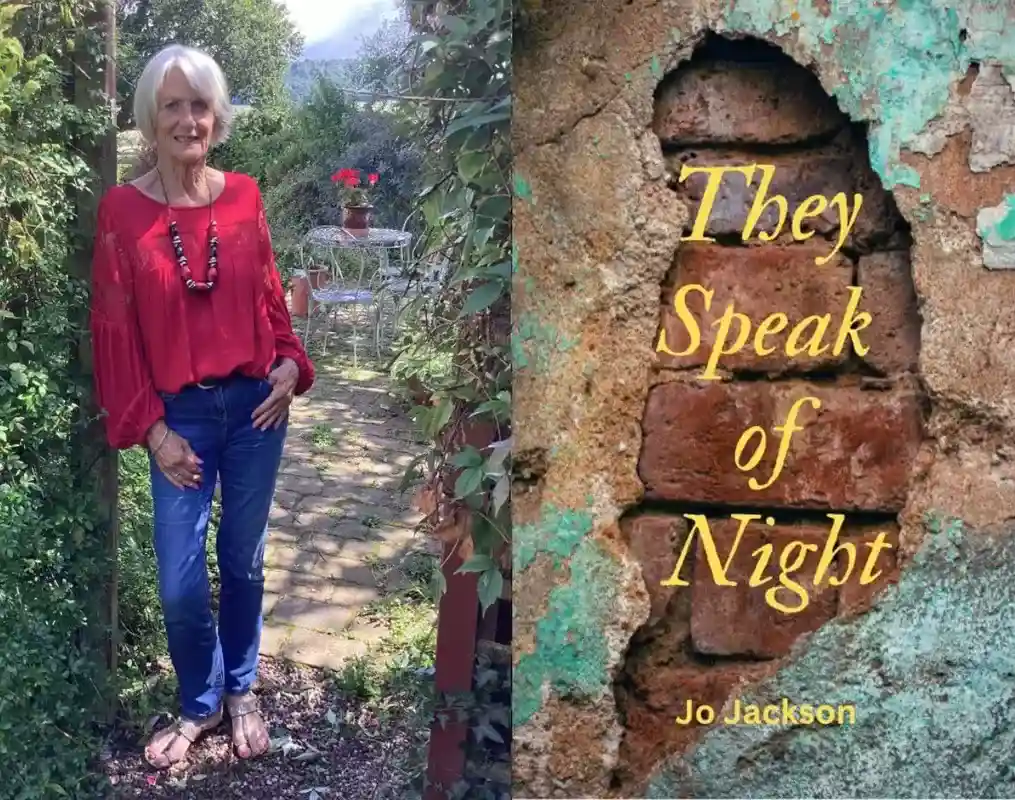
Jo Jackson, a resident of rural Shropshire, is not only an accomplished writer but also a seasoned nurse, midwife, and family therapist. With a career spanning from working in a hospital in London to living in Cairo and specializing in therapy for autistic individuals, Jo’s diverse experiences enrich her novels.
Set in India, Jo’s latest work, They Speak of Night, explores the themes of human connection, friendship, and the courage people face while having to navigate the complexities of war and political conflicts.
In this interview, Jo reveals the inspirations behind her writing, the evolution of her novels, and the real-life inspirations that shaped this poignant narrative spanning decades and continents.
They Speak of Night by Jo Jackson
Q: What inspired ‘They Speak of Night’ during your writing group exercise? How did the glittery box and the exercise shape the story’s development?
A: Although I didn’t know it then the story had its beginning on a hot summer’s day, when the bees were buzzing on the marjoram and the marigolds bloomed orange and bright. It was the first time a group of people were allowed to meet outdoors after lockdown. Our writing group sat in my garden in a wide circle excited to see each other again after months of Zoom sessions.
Remembering that we used to begin our meetings with a ten-minute, spontaneous exercise I hurriedly found a set of glittery boxes that sat inside themselves like Russian dolls. I put the set in the middle of the circle and asked the group to write a paragraph or two about what was inside.
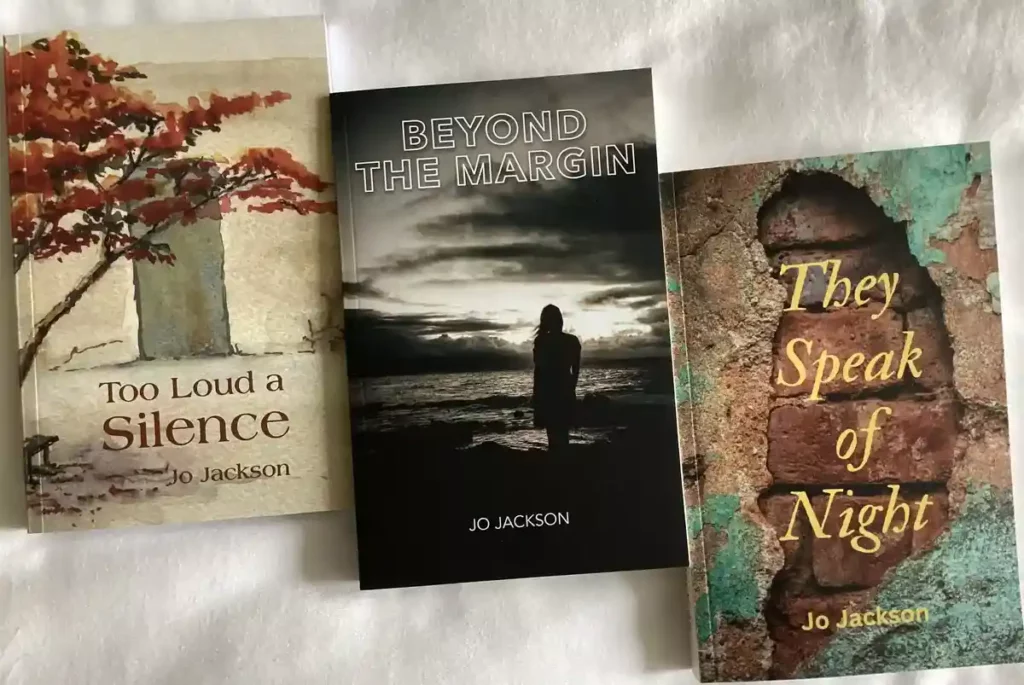
I found myself writing about a lonely young woman finding packets of seeds inside the box. Having no use for them she took them to an allotment where she met an elderly Indian man who encouraged her to plant them in his plot. A friendship developed and life began to have meaning for both of them.
It was weeks later when I remembered those two hastily written paragraphs and the idea that they could become something more was born. I had no idea the story would take me to India and Partition. As with all my books I let the characters tell the story in their own time.
Q: Tell us more about Lily and Asadi, the central characters. How do their paths intertwine in the story, and how do their experiences change them?
A: Lily is a young woman who left university before her final exams unable to continue after a devastating weekend during which she is the victim of a drunken sexual assault, and her mother dies in a freak accident.
Lily is consumed with grief and guilt and is struggling to rebuild her life. She encounters Asadi when she offers him flower seeds that she found in a box in her mother’s house. She has no use for them. She lives in a flat in London above a takeaway shop.
Asadi is a gentle, old Indian man who refuses her gift but suggests that Lily plant them herself in his patch. And so an unlikely friendship develops that envelops Lily in the diversity and camaraderie of allotments and the healing power of nature.
Slowly she begins to regain confidence and explore her own grief through the lives of others. Asadi shares his poignant story of love and violence as India fought for independence. A man and a country in turmoil. They both find the courage to face the loss and grief that has shaped their lives. Friendship proves a powerful healer.
Q: Living in places like Cairo and rural Shropshire and traveling to India surely influenced your perspective. How did these experiences impact your approach to creating fictional worlds?
A: I have always loved to travel and to absorb myself in the cultures of the countries I am visiting. I was fortunate to live in Egypt in the 1980’s and discover the richness of the landscape and the friendliness of the people. India too is a country I love and have returned to four times.
On one occasion I stayed in a remote village in Rajasthan and made it the setting for scenes in They Speak of Night. I visited the school, played hopscotch with the children and we all sat in the sand drawing pictures with my pastels.
Experiences become memories and are food for the imagination. Last year I trekked in Georgia staying with local people in the mountains. The sound of the Ukrainian national anthem sung outside at midnight by our Ukrainian host and his Georgian wife will remain with me forever.
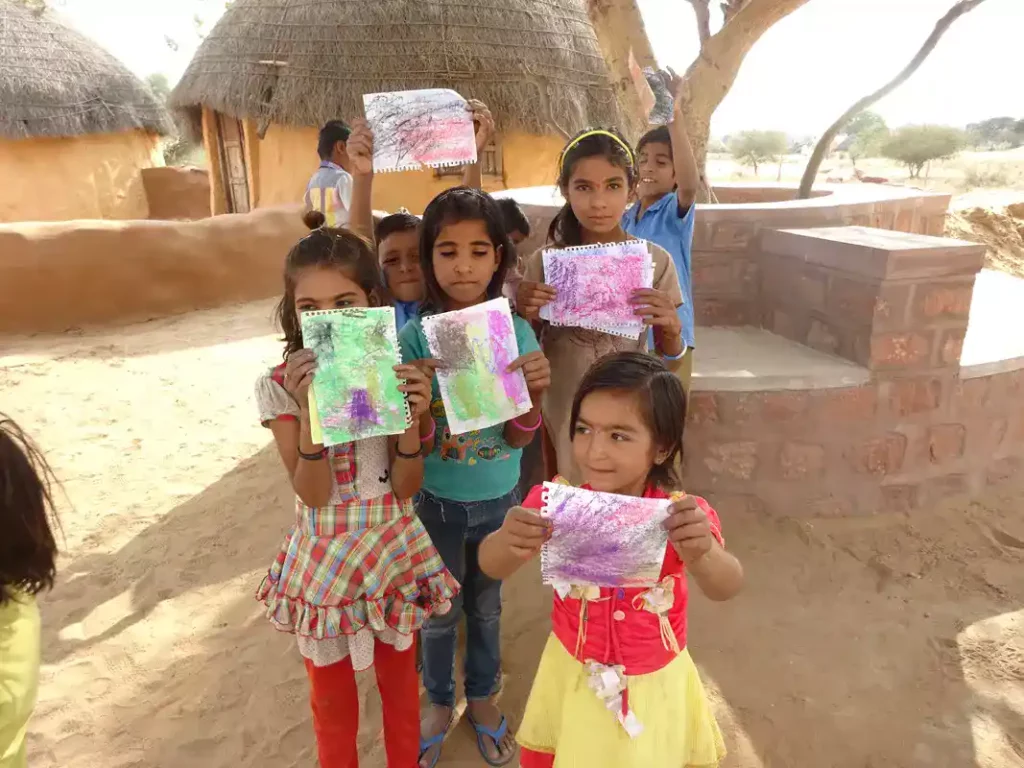
Similarly, many years ago my husband, myself and three young children were helped by a Palestinian family in the Gaza Strip. They gave us a bed for the night in their house and showed us such kindness. Our thoughts are with them at this time.
These unforgettable moments and wonderful people have impacted my life and I try to pay tribute to them by weaving the colours, the sounds, and the nub of their existence into my fictional stories.
Q: Asadi’s story unfolds against the backdrop of India’s struggle for independence and the tragedy of partition. How did you approach researching and depicting these historical events, ensuring accuracy and emotional resonance in your narrative?
A: When I began writing I had no idea that Asadi would take me back to the last days of the Raj and the tragedy of Partition. Through me he wanted to tell his story from the perspective of an ordinary citizen caught up in the politics of the time rather than someone who was influencing it.
I did extensive research, reading personal accounts, books and journals. Much is said about cultural appropriation at present and there is credence in both sides of the debate. It was very important to me to have my manuscript authenticated. An Indian lady agreed to read it and give me feedback. I love that she read it in Bangalore amongst the people of whom I was writing.
Q: The themes of grief, courage, and unexpected connections seem central to the story. Can you talk about how these themes are explored through the characters’ experiences and relationships, especially Lily’s journey.
A: They Speak of Night has been described as a book which shows how much more connects humanity than divides it. A sentiment that is particularly relevant in these troubled times.
Grief and courage are experienced at many levels both personal and national and are themes throughout the book, seen through the eyes of Lily, Asadi and later Kyra, I wanted to take Lily’s personal tragedies and show how they permeated her life making her anxious and fearful of places and people.
Asadi’s grief was a nation’s grief which had a devastating and lasting effect on him and those he loved. I tried to demonstrate how we gain courage and strength through the relationships we form. How generosity and kindness, listening and talking can heal.
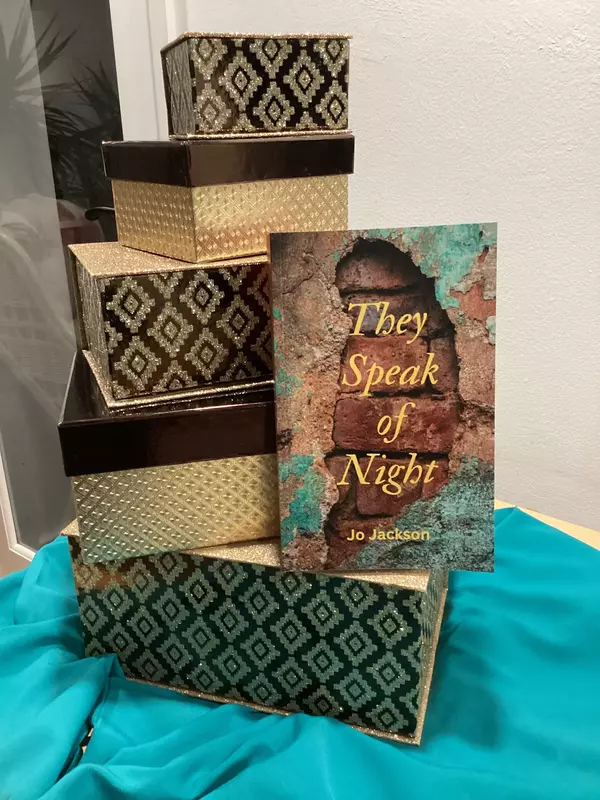
The challenge for Lily arises when Asadi, recognising his impending death, shares his greatest wish for his ashes to be spread on the sacred River Ganges and asks Lily to undertake the task. He insists that before she gives him an answer she must listen to his story and know the person he has been.
Such stories are not always easy to listen to. To reconcile the person, whom you know, with the person they may have been. Courage is recognizing the good in them and understanding the context of their grief. Faced with the dilemmas of others Lily’s own life lessons help her and those she meets.
Q: Your background in nursing, midwifery, and family therapy provides a unique perspective on human relationships. How have your professional experiences influenced the way you approach character development and interpersonal dynamics in your writing?
A: My novels are character-driven and readers tell me how they engage and care about the protagonists because they feel so real. When I write I am in my character’s heads. Throughout my working life I have been privileged to work closely with vulnerable people of all ages.
It has given me a unique opportunity to observe and more importantly to listen. I have been constantly impressed and sometimes awed by their resilience and fortitude and the amazing determination and courage they have shown. The characters in all my books are fictional, but in describing and knowing them as an author comes to do, I have drawn from real-life people and their stories.
Q: You mentioned that your first book was written as a child and placed in your school library. How did that early experience shape your perception of yourself as a writer?
A: Encouragement from parents and teachers is such a boost to a child’s confidence in whatever they do. I was fortunate to have that. I still remember standing in front of my junior school and reading a passage from my ‘first book’. I’m sure I was proud.
I have never thought of myself as an author but pondered the question recently when a lady I didn’t know approached me in the street and said, ‘You’re the local author aren’t you?’ When do you become an author – after one book, two books? The answer may be different for everyone.
Q: Finding time to write amid a busy life can be challenging. Can you share your writing routine? How do you manage your creative pursuits alongside other responsibilities?
A: Retirement brings many advantages!
I am a morning person. That’s when I am at my most creative. I love to rise early, often before dawn and write for a couple of hours. The birds are singing outside, the dog is curled up beside me and I can lose myself in whatever scene I’m writing. I can write anywhere and have no particular writing den.
I live amongst the beautiful Shropshire hills and walking, painting and gardening are other favourite pursuits. There must also be time for travelling. We have a touring caravan and have been to every corner of the UK as well as far-flung holidays abroad. Inspiration can come from seeing someone on a beach, hearing a snatch of conversation as well as stunning scenery or a different culture.
Q: As a writer, do specific themes or genres attract you in your reading? Are there authors or books that have inspired your writing style?
A: I am an avid reader of fiction and non-fiction and can never be without a book. I enjoy a novel in which characters are the central focus: one in which I can be absorbed into the story and feel bereft when I finish.
The Twin by Gerbrand Bakker
The God of Small Things by Arundhati Roy
A Suitable Boy by Vikram Seth
and A Little Life by Hanya Yanagihara
… are just a few of the authors I admire.
If anyone recommends a book as a ‘light holiday read’ it immediately puts me off!
Q: Compared to your earlier works like ‘Beyond the Margin’ and ‘Too Loud a Silence’ what sets ‘They Speak of Night’ apart? Are there consistent themes or ideas you explore across your novels?”
A: I don’t intentionally set out to explore a particular theme or idea in a novel and I see each book as an entirely separate entity. In my first book the writing was more lyrical, in the second it was edgy and direct. They Speak of Night has a different structure with chapter headings absent in the middle third of the book. Each book is tailored to its context.
I have been asked about my strong female characters and how and why I chose the big political conflicts of the Arab Spring in Too Loud a Silence and Partition in They Speak of Night as contexts.
War brings out the best and the worst in humanity. It is the extraordinary courage of the people who are caught up in events beyond their control that fire my imagination, not the politicians. History teaches us lessons but we rarely heed them.
For more with Jo, make sure to follow her newsletter, or follow her on social media.
Happy reading! ❤️
